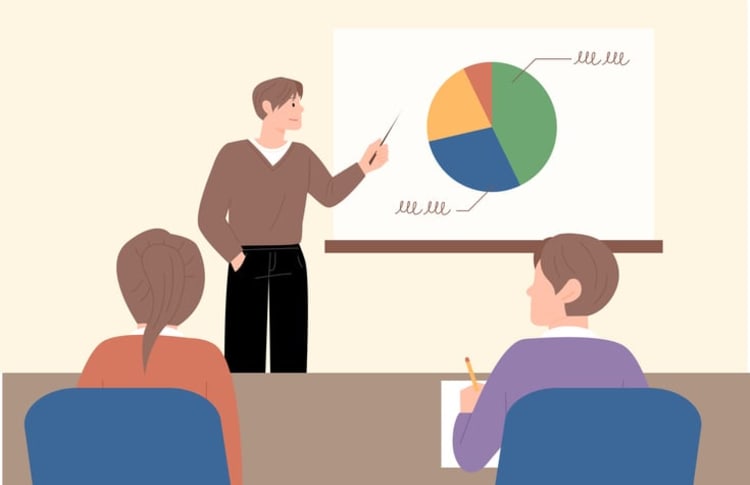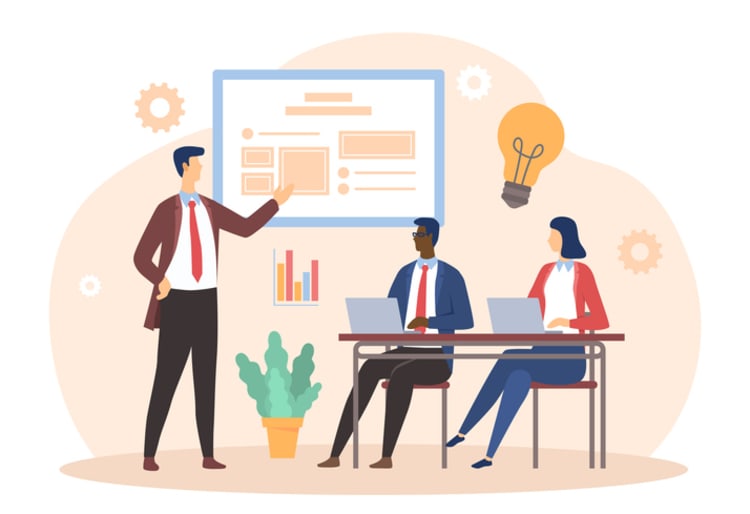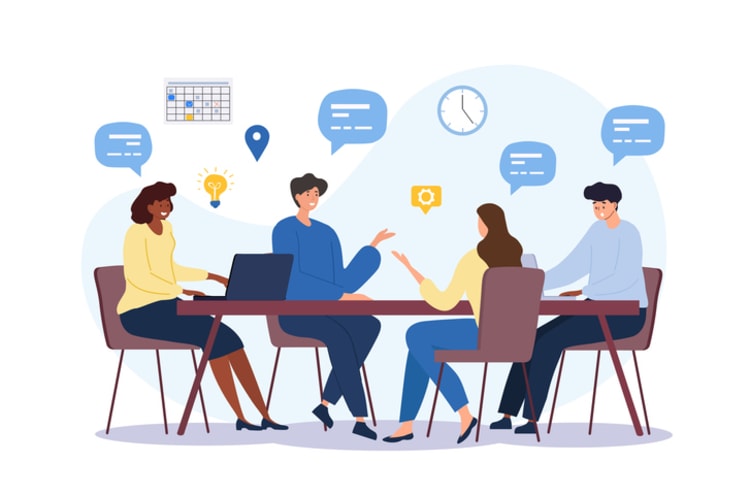Have you ever been in a meeting that seemed to drag on forever, with no clear direction or outcome? The key to avoiding such unproductive gatherings lies in effective meeting facilitation. In this blog post, we will explore the role of a meeting facilitator, essential skills for success, and various techniques to create engaging and efficient meetings. By implementing these strategies, you will not only improve the quality of your meetings but also contribute to the overall success of your team.
Key takeaways
- A meeting facilitator should create an environment conducive to achieving objectives, guide discussions and manage time.
- Essential skills for successful facilitation include active listening, empathy and adaptability.
- Preparing for a successful meeting includes setting an agenda, inviting relevant attendees & establishing ground rules.
The role of a meeting facilitator

A successful meeting depends on the skills and expertise of the meeting facilitators. As a designated facilitator, your primary responsibility is to:
- Create an environment conducive to achieving the meeting’s objectives
- Guide discussions
- Manage time
- Ensure goals are met
Mastering these essential roles can transform you into a great facilitator, fostering effective meetings and steering your team towards success.
Guiding discussions
One of the main tasks of a meeting facilitator is to:
- Guide discussions, keeping conversations on track and promoting open dialogue
- Active listening and the ability to redirect the conversation when necessary
- Stimulate active participation among meeting attendees, ensuring that key ideas are explored and all voices are heard
A great meeting facilitator achieves this by employing various techniques. These include:
- Posing pertinent or difficult questions
- Engaging all team members
- Maintaining the meeting’s progress
- Encouraging introverted members of the group to partake in the meeting by being supportive, inquiring directly for their input, and ensuring they cannot be overridden by more vocal team members.
Effective guidance of discussions allows a facilitator to cultivate a productive environment, fostering the exchange of new ideas and solutions.
Managing time
Managing time is a crucial aspect of effective meeting facilitation. To do so, the facilitator must set time constraints for agenda items, observe progress, and ensure that the meeting remains on schedule. By adhering to the allotted time and establishing a sensible pace of discussion, the facilitator can guarantee that the meeting attendees stay focused and engaged.
One way to impose time limits for agenda items is by setting a timer or allocating a designated amount of time for each item. This helps encourage participation by ensuring that everyone has an opportunity to contribute within the given time frame.
Guaranteeing that the meeting stays on schedule and attains its objectives hinges on monitoring progress and keeping the conversation agenda-focused.
Ensuring goals are Met
The facilitator plays a vital role in ensuring that the meeting’s goals are met. This involves clarifying objectives, maintaining focus, and leading the group towards decisions. The facilitator ensures the achievement of the desired outcome by keeping the team on track and addressing key ideas and points during the decision-making process.
In addition to guiding discussions and managing time, the facilitator must also address and manage any disruptive behaviors that may hinder the efficiency of the meeting. By creating a productive environment and ensuring that all attendees are actively engaged, the facilitator contributes to the overall success of the meeting and the achievement of its goals.
Essential Skills for meeting facilitators

To be an effective meeting facilitator, one must possess a set of essential skills. These skills include active listening, empathy, and adaptability. Mastering these skills enables the facilitator to handle various situations and personalities, ensuring that all meeting participants have the opportunity to contribute and that the desired outcomes are achieved.
Each of these essential skills will be explored in more detail in the following sections.
Active listening
Active listening is a crucial skill for meeting facilitators, as it helps them fully comprehend what others are expressing and the sentiment behind it. The facilitator can promote participation and comprehension among meeting attendees by asking questions, demonstrating body language, and summarizing key points.
Active listening can be practiced during a meeting by:
- Requesting clarification
- Sustaining eye contact
- Nodding
- Focusing on participants’ ideas and contributions
- Providing nonverbal feedback
These practices empower the facilitator to ensure that all attendees feel heard and respected, thus contributing to a more effective meeting, whether in person or virtually.
Empathy
Empathy is the ability to understand and relate to the feelings of others, which is essential for meeting facilitators. Demonstrating empathy enables facilitators to establish rapport with participants, comprehend their perspectives, and cultivate a supportive atmosphere. This creates an environment where individuals feel comfortable expressing their ideas and opinions, ultimately leading to more productive discussions.
To practice empathy, facilitators must actively listen to participants, seek to understand their motivations and intentions, and create a safe and inclusive environment for all. Showing genuine interest and concern for the well-being of others aids facilitators in fostering a more open and collaborative atmosphere where all participants feel heard and respected.
Adaptability
Adaptability is the ability to modify one’s approach in response to different situations and personalities. This skill is essential for meeting facilitators, as it allows them to be flexible, open-minded, and willing to learn and grow in different environments. Adapting to various meeting types, industries, and unforeseen circumstances enables facilitators to better manage the diverse challenges they may encounter.
For instance, a facilitator may need to alter their approach when directing a meeting with a group of experts in a specific field or when managing a challenging situation that arises during a meeting. Being adaptable not only enables facilitators to handle various situations effectively but also contributes to their overall success in guiding productive and efficient meetings.
Preparing for a successful meeting

An effective meeting starts with thorough preparation. This involves setting an agenda, inviting the right attendees, and establishing ground rules. By following these steps, meeting facilitators can ensure a productive and efficient meeting that achieves its objectives.
The importance of each of these preparatory steps in ensuring meeting success will be discussed in depth in the subsequent sections.
Setting an agenda
A well-prepared meeting agenda is crucial for guiding discussions and keeping the meeting focused on its objectives. By outlining the topics to be discussed and the time allocated for each, the facilitator can ensure that the conversation remains relevant and efficient. Sharing the agenda with participants in advance also allows them to prepare for the meeting and contribute more effectively.
To create a comprehensive agenda, facilitators should follow these steps:
- Begin by listing all the topics to be discussed, along with their respective time limits.
- Once the agenda is finalized, distribute it to all participants.
- Allow participants the opportunity to propose revisions or modifications if necessary.
Having a clear and concise agenda enables facilitators to effectively steer the meeting towards its desired outcome.
Inviting the right attendees
Inviting the right attendees to a meeting is essential for ensuring that all necessary stakeholders are present and can contribute meaningfully to the discussions. Providing context and objectives in the meeting invitation can help attendees prepare for the meeting and understand their roles and responsibilities during the discussions.
When inviting attendees, facilitators should consider the meeting’s purpose, the participants’ expertise, and their availability. Carefully selecting attendees empowers facilitators to ensure that the meeting is productive, efficient, and meets its intended goals. Additionally, this allows for a more focused discussion, as all attendees are aware of the rationale for convening and what will be deliberated.
Establishing ground rules
Establishing ground rules for a meeting is essential for creating a respectful and collaborative environment where all participants feel comfortable and supported. Some common ground rules may include:
- Showing respect for each other’s opinions
- Refraining from interrupting
- Staying on topic
- Listening actively
Setting clear expectations and fostering a safe space for open dialogue enables facilitators to ensure all participants feel heard and respected, thus leading to a more productive meeting.
To establish ground rules, facilitators should communicate the expectations and guidelines at the beginning of the meeting, allowing for any necessary clarifications or additions from participants. By adhering to these ground rules throughout the meeting, facilitators can maintain a positive and supportive atmosphere that encourages open communication and collaborative problem solving.
Techniques for encouraging participation

Encouraging active participation in a meeting is critical for achieving its objectives and fostering a collaborative atmosphere. In this section, we will explore two key techniques for encouraging participation: managing dominant personalities and supporting passive participants.
Employing these strategies enables facilitators to ensure all voices are heard, making the meeting both productive and inclusive.
Managing dominant personalities
Dominant personalities can often overshadow the contributions of others in a meeting, making it difficult for all participants to be heard. To manage dominant personalities, facilitators must:
- Balance their input with others’ contributions
- Redirect the conversation when necessary
- Assign a different role to the dominant individual, such as meeting timekeeper or main note-taker, to provide space for other participants to speak.
Effectively managing dominant personalities allows facilitators to create a more balanced and inclusive environment where all participants have the opportunity to contribute. This not only ensures that all perspectives are considered but also fosters a more collaborative and productive atmosphere in the meeting.
Supporting passive participants
Passive participants may have valuable insights to offer but may be hesitant to contribute for various reasons. To support passive participants, facilitators can employ several strategies, such as asking open-ended questions, providing opportunities for them to share their opinions, and creating a safe environment for them to contribute.
Actively engaging passive participants and ensuring they have the chance to voice their perspectives allows facilitators to foster a more inclusive and balanced meeting environment. This not only guarantees that all perspectives are considered but also contributes to a more effective and successful meeting overall.
Wrapping up the meeting and follow-Up
An effective meeting requires a proper wrap-up and follow-up to ensure that all key points are reinforced and action items are assigned. In this section, we will discuss the three main steps in wrapping up a meeting and conducting follow-up: summarizing key points, assigning action items, and sharing meeting notes.
Implementing these steps allows facilitators to ensure the effective communication and action upon the meeting’s outcomes.
Summarizing key points

At the end of a meeting, it is important for the facilitator to summarize the key points discussed, reinforcing the meeting’s outcomes and ensuring everyone is on the same page. This can be achieved by taking precise notes during the meeting, focusing on the main points, decisions, and action items discussed.
Providing a clear and concise summary of the meeting helps facilitators ensure that all participants have a comprehensive understanding of the discussions and also reinforces the key points and decisions made. This ultimately contributes to the overall success and effectiveness of the meeting.
Assigning action items
Once the meeting’s key points have been summarized, it is important to assign action items to ensure progress and accountability. Assigning action items involves:
- Clearly defining tasks, responsibilities, and deadlines for each item
- Ensuring that all participants understand their assigned tasks
- Holding participants accountable for completing their tasks
This process helps ensure that progress is made and that every person responsible is accountable for their part in achieving the meeting’s objectives.
Assigning action items and setting clear expectations for their completion enables facilitators to ensure the meeting’s objectives are met and progress is made towards achieving the desired outcomes. This not only keeps the team on track but also contributes to the overall success and effectiveness of the meeting.
Sharing meeting notes
Sharing meeting notes is an essential step in the follow-up process, as it provides a detailed record of the meeting and allows absent team members and relevant parties to stay informed. To share meeting notes effectively, facilitators should take thorough notes during the meeting, ensure that all pertinent information is included, and distribute the notes to all applicable parties.
Sharing meeting notes helps facilitators ensure not only that all participants have a comprehensive understanding of the discussions, but also maintain alignment and communication within the team. This ultimately contributes to the overall success and effectiveness of the meeting.
Tips for continuous improvement as a facilitator
As a meeting facilitator, it is essential to continuously improve and refine your skills in order to guide more effective and successful meetings. Three tips for continuous improvement will be explored in this section: seeking feedback, learning from others, and adapting to different meeting types.
By implementing these strategies, facilitators can enhance their capabilities and better serve their teams.
Seeking Feedback

Soliciting feedback from meeting participants is a valuable way to identify areas for improvement and demonstrate a commitment to growth and development. By asking for specific feedback on their facilitation techniques, meeting structure, and overall effectiveness, facilitators can gain valuable insights into how their approach is perceived by others.
Actively seeking feedback and using it to enhance facilitation skills allows facilitators to continuously improve and better serve their teams. This not only contributes to more effective meetings but also fosters a culture of growth and learning within the team.
Consider using a virtual office platform
As the landscape of today’s business landscape evolves to embrace remote and hybrid working arrangements, so do the complexities of effective meeting facilitation. A great meeting facilitator needs to evolve to meet the needs of physically distributed meeting participants.
To navigate this new normal, many meeting facilitators turn to using virtual office software. Kumospace has become the global leader for this type of software which combines the benefits of video conferencing, team chat, and spatial audio to facilitate greater communication and collaboration during team meetings.
Learning from others
Another way for meeting facilitators to improve their skills is by learning from others. This can involve observing experienced facilitators, attending workshops, and reading books on meeting facilitation. By gaining insights from a variety of sources, facilitators can expand their knowledge, experiment with new techniques, and discover best practices for different meeting types and situations.
Continuously learning from others and incorporating new insights enables facilitators to enhance their skills, adapt better to different meeting types, and ultimately contribute to more effective and successful meetings.
Adapting to different meeting types

In addition to seeking feedback and learning from others, it is also essential for facilitators to adapt to different meeting types, adjusting their techniques based on the meeting’s purpose, industry, and participants. By being adaptable and flexible in their approach, facilitators can better manage the diverse challenges they may face and ensure that the meeting is productive and efficient.
Adapting to various meeting types and adjusting their facilitation techniques accordingly enables facilitators to:
- Enhance their skills
- Contribute to the overall success of their meetings
- Ensure the achievement of their team’s objectives
- Provide the opportunity for all participants to contribute
Summary
Throughout this blog post, we have explored the essential skills and techniques for effective meeting facilitation, from guiding discussions and managing time to encouraging participation and wrapping up the meeting. By mastering these skills and continuously seeking improvement, meeting facilitators can ensure that their meetings are productive, efficient, and achieve their desired outcomes. As a result, facilitators play a crucial role in the success of their teams, fostering collaboration and driving progress towards shared goals.
Frequently asked questions
A meeting facilitator combines a series of roles such as keeping people on topic, listening carefully to ensure no points get lost, suggesting creative problem-solving techniques, and helping to address conflict. All of these tasks are done with the goal of ensuring the group has a successful, efficient, and thorough discussion.
A facilitator is a person who helps to guide and manage group discussions and activities to meet specific goals. They act as a neutral party to promote open communication, foster collaboration and ensure that all participants are heard and their contributions valued. The main roles of a facilitator include agenda setting, guidance, task management, motivating learners and managing the emotional culture of the group.
To be a good meeting facilitator, plan ahead for who will be attending and what the talking points and outcomes should be. Also, assign roles, practice active listening, and ask leading questions, while keeping the conversation engaging with collaborative tools. Finally, empower all attendees to contribute to the discussion.
The chairperson is responsible for leading and concluding the meeting, while the facilitator's role is to ensure the discussion and decision-making stay on track. It's possible to have one person assume both roles.
A facilitator can promote active participation by guiding discussions, managing dominant personalities, and supporting passive participants to ensure equal contribution from all members.





